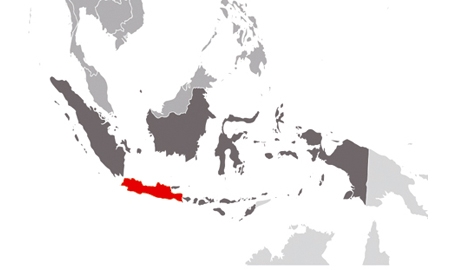Home to the nation’s capital and 135 million people, Java has better economic and social conditions in comparison with the other corridors. Under the theme ‘driver for national industry and services provision,’ Java’s potential to progress in its value chain from manufacturing-based economy to a service-based one will be developed, while paying special attention to water and environmental conservation.
The main economic activities to be promoted under the MP3EI are food & beverage, textile, transportation equipment, shipping, ICT and defense equipment.
Among the manufacturing industries, food & beverage employs the highest number of people, and production accounts for more than 22% of total manufacturing production in the corridor. The sector overall will receive an added boost once import duties on raw materials are reduced, tariffs on end-products raised, and the cost of packaging materials lowered.
Another big employer and source of foreign exchange, the textile industry is the only non-oil manufacturing export industry with a positive net export. However, as Indonesia imports 90% of raw cotton materials, a domestic cotton growing industry could integrate the upstream sector with an emerging garment design industry in Jakarta.
Java is a big industrial player, contributing 80% to Indonesia’s equipment and machinery sector. Of this, the transportation equipment segment is the largest contributor. While the MP3EI envisions a rise in both domestic car sales and exports of vehicles, it sets strategies for developing new and existing seaport car terminals, raising the level of human resources to attract more original equipment manufacturers (OEMs), and participating in the global arena with harmonization of automotive industry standards, among others.
As an enormous archipelago nation with extensive territorial waters, Indonesia requires a strong shipping industry for both transport and defense. Nevertheless, the country ranks 18th globally as a ship builder. In terms of general defense, Java is mandated to further develop the defense equipment industries to reduce dependence on imports and raise the local content, all while encouraging further economic activity.
Finally, ICT development has been highlighted as a vehicle to improve Indonesia’s competitiveness and create a knowledge-based economy. By 2015, Indonesia is set to have a National Broadband Network (NBN), based on the Telkom Super Highway network and the other network operators that currently exist. Specific targets for 2014 are reaching a broadband connection of 8% of households and 30% of population. For the ICT sector to truly develop, the MP3EI stresses the importance of harmonizing policies and government programs to create a conducive atmosphere, expanding the use of ICT applications in various major economic activities, and building domestic applications and digital content industries, among others.

0 COMMENTS